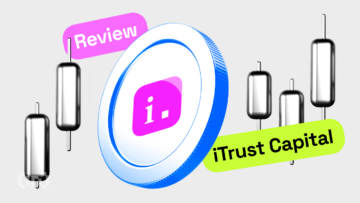The success of your crypto investments doesn’t just rely on picking the right coins; it also involves the intricate art of crypto portfolio management. Drawing from financial theories that date back to the 1950s and the advent of digital asset strategies, managing your portfolio is essential for balancing risks and maximizing returns.
This article will delve into why managing your crypto assets is crucial, the fundamentals of portfolio management in the digital realm, and practical tips for optimizing your investments. Let’s embark on this journey to demystify the essentials of crypto portfolio management.
Keep an eye on all your investments with the most popular free trackers
Delta app
Best for multi-asset tracking (Stocks, crypto, forex and etc)CoinStats
Supports all major crypto platforms and DeFi protocolsUphold
Trade between multiple asset classes from one account- What is portfolio management in crypto?
- Why manage a crypto portfolio?
- What tools are used to manage a crypto portfolio?
- Delta app
- CoinStats
- Uphold
- Bitsgap
- eToro
- How to choose a good crypto portfolio tracker
- How to manage a crypto portfolio
- Crypto portfolio management mistakes to avoid
- What is the best cryptocurrency portfolio tracker?
- How do I track my crypto portfolio?
- Crypto portfolio management apps are essential tools
- Frequently asked questions
What is portfolio management in crypto?
Portfolio management in crypto involves strategically selecting and allocating various digital assets to optimize returns and minimize risks. It often includes tracking the performance of your investments in real time, diversifying across different types of cryptocurrencies, and making adjustments based on market conditions.
Effective crypto portfolio management also helps you make informed decisions by keeping emotions in check and using various tech tools for tracking and analysis.
With an exponential increase in the number of blockchain transactions and the growth of web3 in general, crypto investors might find it more difficult than ever to keep track of their investments. Having a crypto tracker where users can connect their different wallets can offer a more insightful perspective on a portfolio’s performance and value.

Why manage a crypto portfolio?
Managing a crypto portfolio is crucial for a multitude of reasons rooted in both traditional and modern financial theories. Drawing from Nobel Laureate economist Harry Markowitz’s work from the 1950s, the concept of portfolio management in crypto also emphasizes balancing risk and returns based on an individual’s financial goals and risk tolerance. The digital asset markets offer various tokens, derivatives, and decentralized finance (DeFi) opportunities that can be strategically selected to meet these goals.
Beyond simply buying and selling assets, managing a crypto portfolio involves meticulous planning, like setting investment goals, defining risk tolerance, and asset allocation based on diversification strategies. Such strategies may include investing in different types of tokens or asset classes within the crypto ecosystem, employing staking or derivatives for hedging, and even spreading holdings across multiple wallets for additional security against hacks.
Measuring and monitoring portfolio performance is another key aspect, given the fast-paced and highly volatile nature of the crypto markets. Portfolio management software, ranging from free to institutional-grade tools, enables real-time tracking and provides analytical capabilities for performance evaluation. Regularly reviewing this performance data ensures that the portfolio stays aligned with its investment goals and adapts to market changes.
Finally, rebalancing the portfolio is essential to maintain the originally defined asset allocation, thereby executing a disciplined strategy of buying low and selling high. This action keeps the portfolio aligned with its initial objectives and market performance, making it resilient to market volatility.
What tools are used to manage a crypto portfolio?
Delta app
Use the Delta Investment Tracker app to effortlessly track your investments all in one place.
With support for over 10,000 different assets like stocks, crypto, and mutual funds, Delta provides a comprehensive view of your financial landscape. Connect accounts from over 300 crypto exchanges, wallets, and brokers, or add holdings manually for real-time updates.
The app offers personalized notifications and watchlists, detailed insights into your portfolio’s performance, risk levels, and trading fees, allowing you to make informed investment decisions. Compare your portfolio’s growth against benchmarks and fine-tune your investment strategy based on real-time data and analytics. Delta even keeps you updated with live asset prices and their driving factors.
- Supports a wide range of assets (over 10,000 assets)
- Comprehensive portfolio overview
- Benchmark comparisons against various market indices and other portfolios
- Investment analysis
- Real-time price updates
- User-friendly interface
- No in-app trading
- Limited sync support and potential issues
- Data delays
- Limited regional support
CoinStats
CoinStats is another great crypto portfolio management app. It syncs with multiple exchanges and wallets, giving you a centralized view of your portfolio’s balance, profit/loss, allocation, and transaction history.
Not only can you track prices and charts for over 20,000 supported coins, but you can also set custom alerts for price movements and news events. The app’s built-in swap feature lets you conveniently trade your crypto assets across various platforms, including Binance and Coinbase, without leaving the app.
With CoinStats Earn, you can capitalize on high DeFi interest rates of up to 20% APY, offering both safety and low fees.
The app is also a multi-network DeFi wallet, where you can store and manage all your crypto holdings in one wallet that supports multiple blockchain networks. It even allows you to swap assets and adjust network fees within the app.
- Comprehensive portfolio management
- Real-time price alerts
- Built-in trading
- Multi-network DeFi wallet
- Strong security measures
- User-friendly interface
- Some features only available for paid plans
- Past API sync issues
- Limited Support for new exchanges and wallets
Uphold
You should use Uphold as a crypto portfolio management platform for its comprehensive range of financial products and services that allow you to buy, sell, and trade not just cryptocurrencies but also other assets like precious metals. Its transparent fee structure eliminates surprise costs, and its user-friendly interface makes it a suitable choice for those new to crypto trading. However, keep in mind that it may not offer as many cryptocurrencies or advanced trading features as some other platforms.
- Comprehensive asset range
- Transparent fees
- User-friendly platform ideal for beginners
- Offers a cashback debit card
- Limited cryptos
- No advanced features
- High spread fees
Bitsgap
Bitsgap stands out as a versatile crypto portfolio tracker. It supports over 25 leading exchanges, including giants like Binance and Kraken, giving you comprehensive market coverage.
Bitsgap’s trading bots offer automated strategies to optimize your crypto trading. Its Grid Trading Bots excel in markets with sideways momentum, allowing you to profit from small price fluctuations. The app also offers advanced risk management tools, making your trading strategies more resilient. It also operates 24/7, so you can earn even when you’re offline.
- Comprehensive trading tools including signals, arbitrage, and bots
- Simplifies portfolio management across multiple exchanges
- User-friendly interface integrates with popular crypto exchanges
- High-end technology ensures secure growth of crypto investments
- Some features can be confusing
- Bots may not always execute as expected
- Non-flexible refund policy
eToro shines as a social copy trading platform, allowing you to learn from and mimic the strategies of successful traders.
The platform offers a flat 1% fee for trading physical cryptocurrencies, making it cost-effective for trading a large number of crypto assets. With the eToro Money wallet app, you can easily manage and transfer your cryptocurrencies.
The mobile app offers a seamless experience across devices, and VIP perks such as access to Trading Central and discounted fees can significantly enhance your trading experience. Overall, eToro’s combination of social trading, cost-efficiency, and strong mobile experience makes it a solid choice for managing your crypto portfolio.
- Social copy trading
- Flat 1% fee for trading cryptocurrencies
- eToro Money wallet app for easy crypto management and transfers
- Seamless mobile experience across devices
- Slightly higher spreads on EUR/USD compared to industry average
- Limited charting tools on the mobile app
- Algorithmic trading not supported
How to choose a good crypto portfolio tracker
If you’re looking to up your game in managing your crypto assets, consider using a portfolio manager. There are many crypto portfolio trackers on the market there. But unless you’re a pro with a large portfolio, stick to something straightforward.
For a top-notch crypto portfolio manager, look for trading features, real-time data, and types of assets offered.
Trading features
- Connects to multiple trading platforms
- Compiles order books from various exchanges and dealers
- Routes your trades to get you the best deals
Real-time and past data
- Offers real-time and past market information
- Provides insights into your portfolio’s performance and risks
- Consolidates trades from various platforms for easier analysis
Types of assets covered
- Includes spot markets
- Covers futures and related costs
- Supports options and loans
How to manage a crypto portfolio
When it comes to managing your crypto assets, a few simple guidelines can make a big difference. First, aim for a well-rounded portfolio. The allure of cryptocurrencies can make it tempting to put all your money in one place or trade with excessive leverage. But the first step to managing your crypto wisely is actually having a diverse portfolio. Diversification helps you spread the risk, making you less prone to emotional, rash decisions.
Secondly, diversification in the crypto world can be challenging because many assets tend to move in sync. A smart move is to invest a significant chunk of your portfolio in established coins like bitcoin. While you may not see skyrocketing gains, you’re also less likely to face steep losses, especially in a bear market.
Lastly, keep tabs on your investments. If your capital is spread across various assets and platforms, it can be tricky to monitor performance. Utilizing crypto portfolio management tools can help you keep track and make adjustments as needed.
Using a portfolio tracker
Let’s take a look at how to use a crypto portfolio management app. For this example, we’ll use the Delta Investment Tracker app, but most crypto tracker apps will present similar functionalities.
/Related
More ArticlesStep 1. Sign up for an account
Before you can start using a portfolio management app, you’ll need to sign up.
With Delta, the app is exclusively designed for mobile use. So, you can get an account only by installing the app on your device.
After you get the Delta app, you can sign up for an account.
Note that the Delta mobile app is powered by eToro. If you already have an eToro account, you can choose to sign up using the same account. In this case, your public profile and personal information shared on eToro will also be shared with Delta.
Step 2. Connect to your wallets and crypto exchange accounts
After creating an account, you can connect your portfolio to the chosen tracker app. This is the step where you connect your wallet to be able to see your crypto investments or any other assets in real-time using only one app.
In the case of Delta, if you signed up with an eToro account, you can choose to import your eToro holdings.
On Delta mobile app, you can choose your import options as follows:
- Import all transactions
- Import all transactions starting from a set date
- Import new transactions only
- Important balances only
If you don’t have an eToro account, you can choose to connect to other crypto wallets, exchange accounts and brokers accounts you have on different platforms.
Delta app supports multiple crypto wallets, but note that the free version only allows you to create two connections. For unlimited connections, you’ll need a Delta PRO account (starts at $5 per month but depends on your location).
For each selected connection, the app will give me detailed instructions on how to create the connection.
Step 3. Manage your assets from one single portfolio tracker
You can create different portfolios from the app (in the case of Delta app) and all your assets in one place at a glance.
A crypto portfolio management app will give you precise information about the digital assets that are spread across multiple exchanges and crypto wallets. From here, you can easily find new crypto investment strategies in real-time, buy more assets using your credit card, or even use this information to centralize your crypto taxes.
Depending on your chosen crypto tracker app, you can use it for buying and selling assets, keeping up to date with market insights, and having all your wallets and exchange accounts in one single place.
Crypto portfolio management mistakes to avoid
Managing your crypto portfolio can be a rewarding yet complex endeavor, and even seasoned investors sometimes make mistakes. Here’s how you can steer clear of some common pitfalls in crypto portfolio management:
Avoid impulsive investing
A lot of newbies invest based on a hot tip or a tweet, only to regret it later when things go south. Instead of making hasty decisions, use the dollar-cost averaging (DCA) strategy. This involves buying a set amount of a coin at regular intervals, such as once a month, regardless of its current price. This approach helps you resist the urge to sell during short-term market downturns and offers a more stable investment strategy.
Keep track of your assets
If you’re spreading your investments across different coins and even blockchains, it’s crucial to keep a tab on them. There are various crypto portfolio management apps and software, as well as DeFi trackers like Zappier, Debank, Zerion, and Apeboard, that help you monitor all your holdings in one place.
Plan your exit
Even if you’ve got your investment strategy down and are tracking your portfolio, failing to manage your expectations can still get you into trouble. Before investing, think about your exit strategy. Know why you’re investing in a particular asset, when you plan to sell it, and under what conditions you’d change your mind. Having a clear game plan helps you avoid emotional decisions on volatile trading days.
What is the best cryptocurrency portfolio tracker?
The best cryptocurrency portfolio tracker depends on your needs. Some investors prioritize ease of use and look for a tracker with a simple interface. Others need advanced features like tax reporting and want a platform that integrates these capabilities. If you’re into DeFi, look for a tracker that supports decentralized assets and protocols.
Those with diverse holdings across multiple exchanges will want a tracker that can aggregate this data. Real-time updates can be crucial for those who trade frequently. Investors keen on privacy may seek a tracker that doesn’t require personal information.
An exit strategy feature may be valuable for those with clear profit-taking plans. Ultimately, the best tracker matches your investment approach and offers the features you consider essential.
How do I track my crypto portfolio?
To track your crypto portfolio, you’ll want to use a portfolio management software or app. Look for one that suits your needs, whether that’s a simple interface or advanced features like tax reporting. If you have diverse assets across multiple exchanges and blockchains, choose a tracker that aggregates this data for you. Real-time updates are key if you’re an active trader.
For decentralized finance (DeFi) investments, opt for a tracker that supports DeFi protocols. Once you’ve selected the right platform, you can start monitoring your investments and adjusting as needed.
Crypto portfolio management apps are essential tools
Effective crypto portfolio management is essential for both new and seasoned investors. The right portfolio tracker not only helps you keep an eye on your profits and losses but also offers valuable market insight. With features like real-time updates and the ability to connect your wallet directly, these apps are indispensable for tracking your crypto portfolio. Whether you’re dealing with multiple exchanges, grappling with crypto taxes, or looking to streamline your buying and selling activities, there’s likely a mobile app that fits your needs.
Always remember that your cryptocurrency portfolio is not just a list of digital assets; it’s a dynamic landscape that requires attentive management. Take the time to choose a portfolio manager that aligns with your investment goals and makes the intricate world of crypto investments a bit easier to navigate.
Frequently asked questions
How do I manage my crypto portfolio?
Is there a crypto portfolio manager?
What is a safe crypto portfolio?
How do I organize my crypto?
Trusted
Disclaimer
In line with the Trust Project guidelines, the educational content on this website is offered in good faith and for general information purposes only. BeInCrypto prioritizes providing high-quality information, taking the time to research and create informative content for readers. While partners may reward the company with commissions for placements in articles, these commissions do not influence the unbiased, honest, and helpful content creation process. Any action taken by the reader based on this information is strictly at their own risk. Please note that our Terms and Conditions, Privacy Policy, and Disclaimers have been updated.









